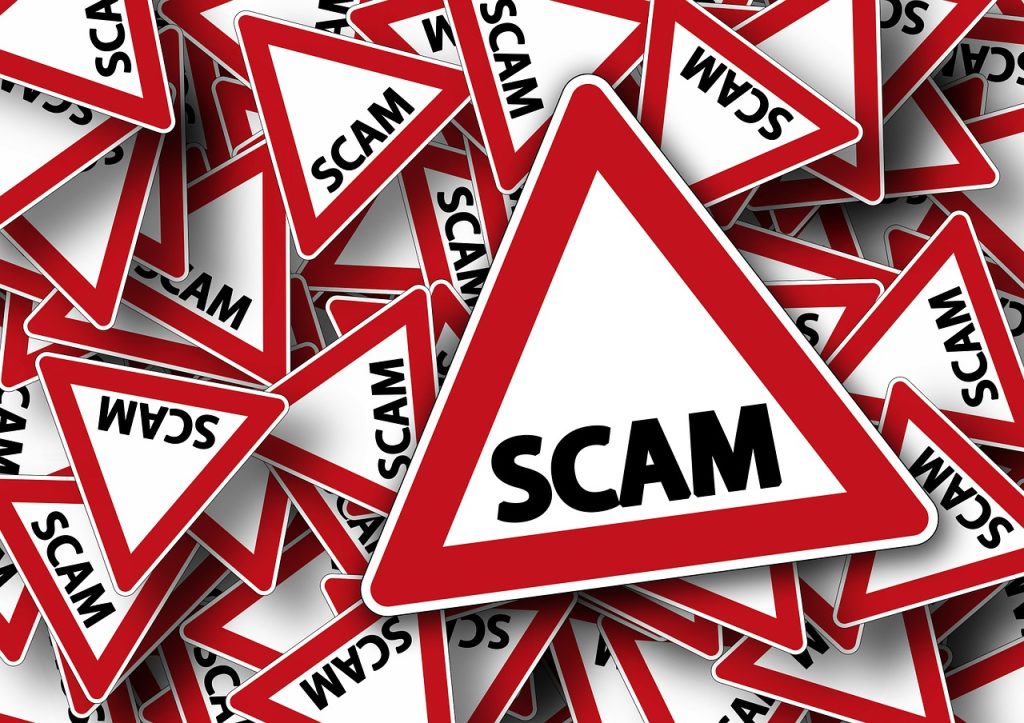Table of Contents
Scammers and identity thieves are everywhere, using snail mail, telephone, and the internet to target unsuspecting victims. The ease of creating a scam has led to veterans, one of the more vulnerable populations, being frequently targeted. To prevent scams and fraud, veterans should understand the common forms they take, how to recognize red flags, and how to report them.
9 Common Types of Scams Targeting Veterans
- Identity Theft
- Phishing
- Impostor Scams
- Clickbait
- Coronavirus Scams
- Rental Scams
- Investment Fraud
- Loan Scams
- Charity Scams
Phishing, rental scams, and imposter scams posing as VA benefits or VA-related organizations are some of the most common to target veterans. Having a military record can unfortunately make you more susceptible to scams that could result in a stolen identity or extorted finances.
While there are some protections in place to prevent veteran-targeted scams and fraud – including reporting via the U.S. Department of Veterans Affairs (VA) and the Federal Trade Commission (FTC) – t’s a good idea to know what to look for to avoid getting caught in a veterans scam.
Why Do Scammers Target Veterans?
A scam can potentially target anyone, especially in today’s modern world with the internet at our fingertips, giving us convenient access to information, contacts, and more. Scammers often target the most vulnerable populations, including the elderly and veterans. Homeless veterans and disabled veterans are among the most targeted, but veteran scams may also seek out an active duty service member, older veterans, and military families.
Fraud happens frequently in the veteran world because scammers can easily target veterans who are seeking veterans benefits from the VA. A scammer may find information of a military veteran who has looked into VA benefits of some kind, using that information to rope the victim into giving money to fake charities, applying for a fake VA loan, or falling into another scam trap.
Although it’s not possible to prevent scams and fraud 100% of the time, it can be easier to avoid a potential scam targeting veterans by being extremely careful with your information. Veterans should learn the signs of a common scam targeting veterans and take steps to ensure that their personal and financial information stays safe, in person and online.
9 Common Types of Scams Targeting Veterans
Scammers find unique ways to appeal to veterans looking for assistance, such as with VA disability benefits or through the Veterans Benefits Banking Program. Below are some of the more common types of scams that target veterans.
1. Identity Theft
Identity theft involves someone stealing your personal information and using it to commit fraudulent acts in your name. Often, cases of identity theft center around money, with a scammer opening credit cards or making purchases using your information.
Since service members have several documents that contain their Social Security number, identity theft can be easier with a military member or veteran. Identity theft is so common in the military service world that the VA created an identity theft hotline and a program: More Than a Number. This program offers resources to veterans and helps them to prevent targeted scams and fraud.
2. Phishing
While phishing can happen through email, mail, and text, it’s usually an email scam. Scammers disguise websites and emails to look legitimate and then attempt to get personal information from trusting veterans.
One prevalent phishing scam disguises a text message or email to look like it was sent from a website you use, like Facebook, claiming that you need to change your password for security reasons. If you click the link and enter your current password to change to a new one, the con artist will now have your password to access your account.
3. Imposter Scams
Imposter scams are similar to phishing scams. With these scams, a scammer pretends to be someone else, like a representative of a charitable organization or a veterans’ organization, to extort money from a veteran. They might even disguise themselves as someone you know or a potential romantic interest.
These scammers have gotten very sophisticated with their methods, often coming across as a legitimate business, organization, or government agency. The Federal Trade Commission has logged more than 378,000 veterans scam reports between 2016-2020, with 24,000 of those reports noting money loss.
4. Clickbait
Clickbait is a common online practice in which a link to an article, app, or website looks legitimate, but may take you to a phishing page or some other page involved in a scam. Clickbait might attempt to have you fill out your personal or financial information, steal your password, or download spyware or malware that’s harmful to your device.
5. Coronavirus Scams
Since the onset of the Coronavirus pandemic, veterans have become the target of scams attempting to get their information in exchange for free testing or vaccines. Scammers might call or email the veteran asking for their Social Security number and financial information for these resources.
6. Rental Scams
Approximately 5.2 million U.S. renters have lost money to a rental scam, and rental scams targeting veterans have recently become more prominent. Veterans are especially at risk for rental scams because of their frequent moves. These scams create realistic listings for apartments or homes for rent, attempting to reel in unsuspecting veterans willing to give their personal information and submit a payment to secure the rental.
7. Investment Fraud
Veterans looking to invest their money could become the victim of investment fraud. The scammer targets a person or group promising investment help to the veteran with investment money up front. Instead of making the promised investments, the scammer takes the veteran’s money. To prevent veterans scam and fraud while investing, use only credible investment companies and don’t fall prey to too-good-to-be-true promises.
8. Loan Scams
A VA loan scam can take the form of a refinancing loan, mortgage loan, car loan, personal loan, or another type of loan you might apply for. These scams appear to offer veterans exclusive deals, usually boasting incredibly low interest rates or monthly payments. However, these imposter loans seek to gather information about you, including your Social Security number and bank information.
9. Charity Scams
Charity scams entice someone to pay money for a non-legitimate charity. Some charity scams target people who want to help veterans, while other scams target veterans in the hopes of tricking them into donating to a fake charity. If you’re not sure if a charity is legitimate, check out the BBB Wise Giving Alliance for helpful resources.
How to Recognize a Scam
Whether you’re applying for veterans benefits or have signed up for a VA loan, you could become the target of a military scam. Con artists find ways to get the information of current and past military personnel through seemingly legit emails, mailings, phone calls, and other methods. Learn how to recognize common scams and red flags with the following tips.
Recognizing In-Person Scams
Door-to-door scams may not happen as much as mail, phone, and internet scams, but they still occur. Scammers may come to your door asking you to donate money to a veterans charity, sign up for a pension benefit or health care, or apply for a loan. The VA will never go door-to-door asking for you to pay money or sign up for anything. If someone comes to your door pretending to be connected to the VA in any way, contact your regional VA office to report it.
Recognizing Mail or Phone Scams
Veterans charity scams often happen through mail or by phone, but scammers may also use these methods to offer you special pricing on things like utilities, loans, cars, or even home loans. If you receive mail or a phone call about these “deals,” look for more information. Check the mailing for a phone number or address, or ask the caller questions about the company so that you can do more research. Never provide sensitive information about yourself or your finances over the phone or by mail.
Recognizing Online Scams
Online scams are among the most prominent to affect the nation’s veterans. It’s becoming increasingly difficult to decipher scams from legitimate charities, offers, and veterans services. However, there are several red flags to look for to prevent veterans scams and fraud online.
First, check the sender of an email. If the email is coming from a legitimate source, like the VA, it will have its official email ending (like va.gov) included in the email address. Also, check the spelling and grammar of the email. Any email might have a mistake or two, but scams often have several flubs. Be careful about clicking the links in questionable emails too, as many of them can lead you to phishing websites waiting for you to input your sensitive information.
When you’re browsing the web, be mindful of the information you enter on forms and making payments. Forms that want you to sign up for more information shouldn’t need anything more than your name, and email, or address. Use payment cards only on secure, trusted websites. Look for the small lock symbol in the address bar to determine if you have a secure connection.
How to Protect Yourself from Identity Theft

Your first line of defense to prevent veterans scams, fraud, and identity theft is to be vigilant about recognizing common scams that target veterans. Operation Protect Veterans, a joint program from the US Postal Inspection Service and AARP, helps to spread the word about these scams targeting military retirees, and it’s an excellent resource to use to refer to when you’re not sure whether an offer is legit.
Here are a few more ways to protect yourself from identity theft and the con artists who attempt to extort veterans of the armed forces.
Prevent a Veterans Scam by Protecting Your Personal and Financial Information
Although a modern scam artist often attempts to target service members online, it’s not uncommon to fall victim to a phone scam or even an in-person scam. As a veteran, it’s necessary to always keep your personal and financial information, including your Social Security Number and bank account numbers, safe.
Most importantly, never provide this information over the phone to a source that you aren’t sure is tied to the VA. If you question it, you can always let the person know you’ll call back once you check with your regional VA office about the validity of the call.
Avoid keeping your Social Security card in your wallet. Instead, tuck it away in a lockbox along with your birth certificate and other personal documents. Never write down the personal identification number (PIN) to your debit or credit cards. Avoid writing down the passwords for any online accounts that could have your personal, bank, or credit card information attached to them. Finally, consider investing in a document shredder to get rid of papers that contain sensitive information.
Prevent a Veterans Scam by Protecting Yourself Online
It’s especially challenging to prevent veterans scam and fraud online since so many of our day-to-day tasks take place over the internet. Although it might be an inconvenience, it’s extremely important to sign out of any online accounts after you use them, including your social media, email, and bank accounts. Doing so makes it more difficult for hackers to gain access to your accounts and personal information.
Similarly, avoid saving your login information to your devices. Instead, use strong passwords that are difficult to guess but easy for you to remember. You can also change your password routinely, such as every three months, to further protect your information from getting into the hands of con artists.
Prevent Veterans Scam and Fraud
Because your VA benefits information can be one of the main ways for con artists to capture your personal details, it’s crucial to safeguard your data. Keep all documents in a safe spot, like a lockbox, in your home, and shred any papers that you no longer need.
When you’re online, be vigilant about what you do. Log out of your VA and financial accounts when you’ve finished using them, and avoid clicking suspicious links in emails or on websites. Report any suspected veterans scams or fraud to the FTC or, if it’s an internet-related scam, to the FBI’s Internet Crime Complaint Center.



